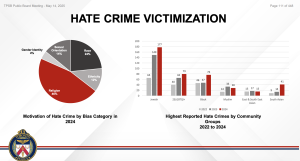Elected officials from all three levels of government got together in Toronto to serve a hot lunch to 140 community members in need at a Sept. 17 event hosted by the Centre for Israel and Jewish Affairs (CIJA) and UJA Federation of Greater Toronto.
Ontario Premier Kathleen Wynne, Toronto Mayor John Tory, Jack Heath, deputy mayor of Markham, Ont., and other political and community leaders served a Rosh Hashanah lunch and heard from members of the community about their daily struggles to provide their families with good food, housing, clothing and transportation, while maintaining a connection to Jewish life.
“Poverty is a daily struggle for thousands of local Jewish families and seniors. Sadly, this is largely an invisible and silent struggle, as poverty within our community is often overlooked,” said Connie Zwingerman, chair of CIJA’s retired professional ambassadors.
There are 24,000 Jews in the Greater Toronto Area, including children and seniors – nearly half of whom are Holocaust survivors – who are living in poverty.
“In uniting our community to offer a helping hand to the most vulnerable among us, we are honoured to have the support of local government officials,” said Shel Geller, chair of UJA Federation’s social service and seniors committee.
In an effort to ensure that no children in the Jewish day school system suffer from hunger, CIJA and UJA Federation’s Koschitzky Centre for Jewish Education have been working with city officials to expand the City of Toronto’s Student Nutrition Program to include students who attend independent schools, including Jewish day schools.
READ: NATIONAL COUNCIL OF JEWISH WOMEN SELLS HISTORIC BUILDING
Earlier this month, the city’s medical officer of health tabled a report and recommendations to the board of health budget committee that endorsed the recommendations put forth by CIJA and UJA Federation.
In a report addressed to the premier, Ontario Ministry of Children and Youth Services, the federal minister of health and other government organizations, the medical officer of health recommended that the board of health adopt the request to “increase the city’s investment rate to 20 per cent of total program costs from 17 per cent in 2017, providing a stronger funding base for existing programs, (and) recognize that all schools in Toronto should be eligible for consideration for municipal funding for student nutrition programs based on need.”







